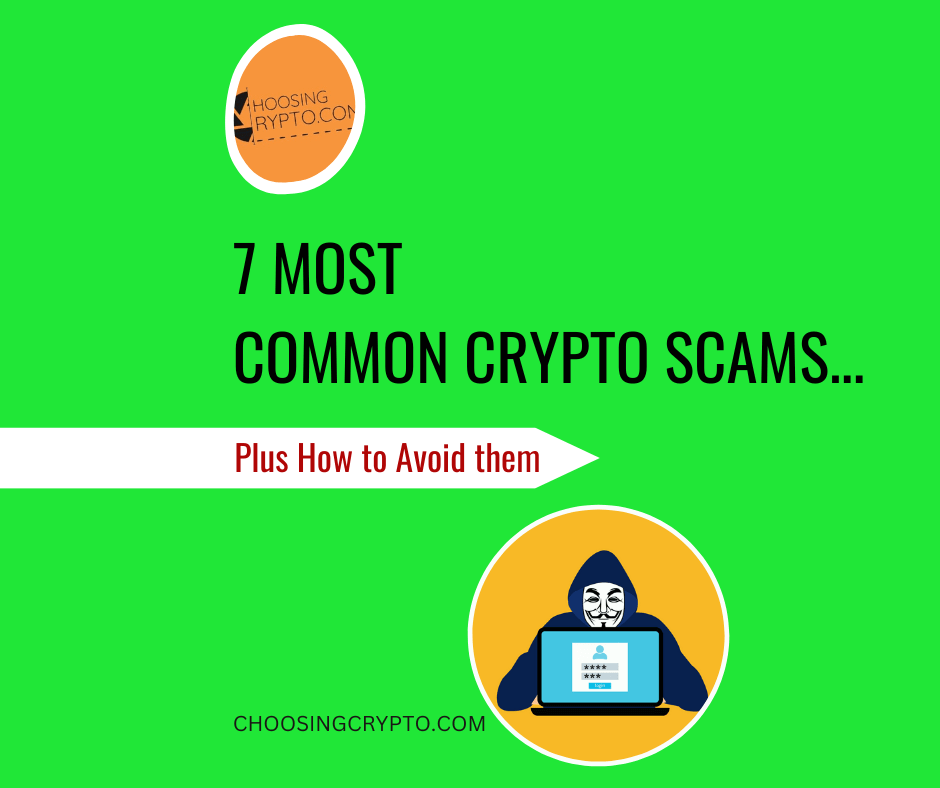Crypto scammers are stealing millions every single day, and the victims aren’t only beginners. They’re experienced investors, influencers, and even tech professionals. Why? Because these scams don’t look like scams, until it’s too late.
You see, in crypto, there’s no safety net. Once you send a transaction, it’s gone. One click on a fake app or one convincing message is all it takes to lose everything. These scams are everywhere and are designed to fool people like you.
It might be a fake exchange. A giveaway that looks official. Or a “support agent” who sounds helpful. It all feels real until your crypto is gone.
By the end of this post, you won’t just know how these crypto scams work, you’ll be able to spot them fast. No more costly mistakes. Just clear, practical advice to help you avoid crypto scams.
New to crypto? I offer beginner-friendly 1-on-1 coaching, and your first session is free. Check it out here.
7 Most Common Crypto Scams and How to Avoid Them
There are lots of common crypto scams out there, but here are some of the ones you’re most likely to encounter:
1. Phishing Scams
Phishing scams aim to steal sensitive information through fake emails, texts, or social media messages posing as trusted crypto platforms.
Their trick? Creating urgency. Messages say things like “Your account is at risk” or tempt you with bait like “You’ve won a prize!”—all to push you into clicking a link.
That link leads to a fake website mimicking a real one. It might look legitimate, but small signs, such as misspelled URLs and design flaws, give it away.
Once there, you’re asked for login details or wallet info. Enter it, and scammers can access your real account, empty your wallet, and vanish.
How to avoid phishing scams:
- Don’t click on unsolicited links with urgent alerts or big promises.
- Check site URLs closely—watch for odd characters or subtle misspellings.
- Activate 2FA on all your crypto accounts to make it hard for scammers to access.
- Enable anti-phishing codes to know when a message is from your platform.
Want more tips to stay safe? Check out my guide on How to Avoid Phishing Scams on Crypto Exchanges.
2. Fake Crypto Exchanges and Wallets
Scammers build fake exchanges and wallets that look professional and legit, but are traps to steal your crypto.
They push these platforms hard through social media, flashy websites, and paid ads. The bait? Irresistible offers like bonus rewards, ultra-low fees, or exclusive deals.
Once you sign up, you’re urged to deposit funds. They might promise free tokens or advanced tools, but none are real. After depositing, you’ll find you can’t withdraw. Your funds are gone, siphoned into scammer wallets.
How to avoid fake crypto exchanges and wallets:
- Stick to trusted platforms with solid reputations like Binance, Bybit, or Gate.io.
- Check independent reviews. No reputation or too many negative reviews are red flags.
- Start small. Test withdrawals before adding more funds. If something feels off, stop using it immediately.
3. Pump-and-Dump Schemes
A pump-and-dump scheme is a fraudulent tactic where scammers artificially inflate a cryptocurrency’s price through hype and lies, then crash it for profit, leaving others with losses.
Scammers spread rumors on social media and forums, calling a coin a “hidden gem” or claiming it’s about to explode.
Investors start buying, prices surge, and the hype feeds itself. Sometimes, the momentum even lands the coin on major platforms, boosting visibility further.
Then comes the dump. Scammers offload their holdings all at once. Prices crash. Late buyers are left holding worthless tokens. Scammers cash out big.
How to avoid pump-and-dump schemes:
- Be cautious of cryptocurrencies with sharp price jumps that aren’t backed by credible news or developments.
- Don’t invest in crypto based solely on promotions from influencers or social media posts. These are common tools for pump-and-dump schemes.
- Focus on coins with real-world utility and long-term value. Avoid chasing hype or quick profits.
Think you’d never fall for a crypto scam? That’s what victims thought too. Learn to protect yourself. Your first session is free. Start here.
4. Ponzi Schemes and Fake Investment Platforms
Ponzi schemes pay old investors with money from new ones. There’s no real profit, just a cycle that collapses when new money stops flowing.
Fake investment platforms operate like Ponzi schemes. They promise high, risk-free returns through trading, mining, or other ventures. But in reality, the money goes to scammers, who vanish once withdrawal requests start.
To appear legit, they use social media ads, fake influencer endorsements, and professional-looking websites showing fake profits and testimonials.
When these platforms fail to attract enough new investors, payouts will stop. The site will disappear, and your money will be gone.
How to avoid Ponzi schemes and fake platforms:
- Seek advice from financial or crypto experts to assess opportunities and identify scams.
- Avoid any platform offering guaranteed or “risk-free” returns. If it sounds too good to be true, it probably is.
- Check online reviews and feedback. Look for warnings from regulators and complaints from past users.
Want to ensure you never fall for fake platforms? Check out my comprehensive guide: How to Know if a Crypto Site is Legit or Fake.
5. Fake Initial Coin Offerings (ICOs)
Legit ICOs raise funds for real blockchain projects. Investors buy these tokens expecting their value to grow as the project develops. Fake ICOs are scams. They either promote nonexistent projects or steal funds collected from investors.
Scammers push these with aggressive marketing, offering tokens at discounted rates, hyped-up returns, and creating urgency with limited-time offers. They brand it a “once-in-a-lifetime” chance.
Investors often pay in Bitcoin or Ethereum. Scammers use polished sites, pro marketing, and big promises to look credible. But once the ICO ends, they disappear. The project is either abandoned or was never real.
How to avoid fake ICOs:
- Check community discussions about the ICO on Reddit, Bitcointalk, and other crypto forums. Silence or complaints are red flags.
- Research the founders and team. Real projects have transparent, verifiable leaders.
- Read the whitepaper. A legit ICO clearly explains its mission, tech, and development plans. Vague buzzwords = bad sign.
6. Giveaway Scams
Giveaway scams are a common tactic used by fraudsters to steal crypto or personal info by posing as celebrities, crypto influencers, exchanges, or blockchain projects. Scammers use fake social media accounts, websites, or emails to push fake promotions.
They claim to celebrate events or launches by offering big crypto rewards, usually Bitcoin or Ethereum. To add pressure, they call it a limited-time offer.
To participate, victims are told to send a small payment to “verify” their account or submit info like private keys or seed phrases. After that, nothing. The scammer vanishes with the funds or data.
How to avoid giveaway scams:
- Never send crypto to join a giveaway. Real ones don’t ask for money to distribute rewards.
- Confirm promotions on official websites or verified accounts of the individual or organization hosting the giveaway.
- Never share private keys, passwords, or seed phrases. No legit giveaway will ever ask for such.
7. Airdrop Scams
Real airdrops give away free tokens to promote new crypto projects. However, scammers have hijacked this idea to steal your funds or private information.
They create fake sites, posts, or social media accounts offering “free” tokens. To build credibility, they ask you to follow them, share posts, or join Telegram groups.
Then comes the trap. They’ll ask for wallet details or prompt you to connect your wallet to their platform, claiming it’s for verification or token distribution.
Some go further, demanding a “processing” or “network” fee. You pay, get nothing, or receive worthless tokens.
How to avoid airdrop scams:
- Use a separate wallet for airdrops to protect your main one.
- If asked to pay a fee, don’t; it’s a scam. Real airdrops are always free.
- Don’t share private keys, seed phrases, or passwords. Real projects won’t ask for these details.
Want personal help with crypto? I offer 1-on-1 coaching, and your first session is free. Book your free session here.
Additional Resources:
- Best Security Practices for All Cryptocurrency Users
- 7 Common Mistakes Crypto Investors and Traders Make
- Important Things Every Crypto Investor Should Know Before Investing
And guess what? We’re also on Instagram and Twitter(X). Join us there for even more fun and useful content!

DISCLAIMER:
The information provided here is for informational purposes only. Do not rely solely on it for making investment decisions. It is not financial, tax, legal, or accounting advice. Always do your own research or consult a financial advisor before investing in cryptocurrency.
